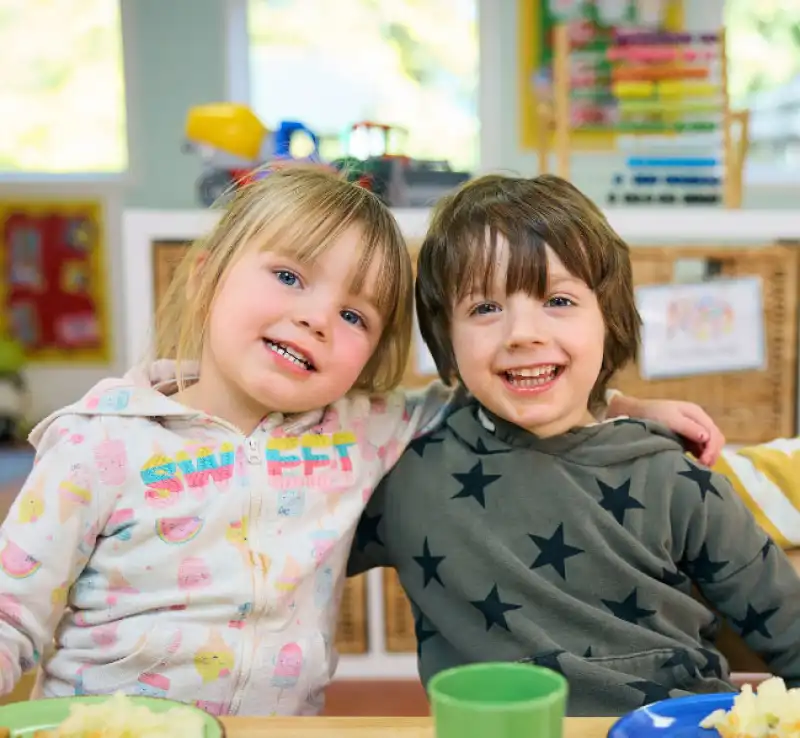
Creating Positive Mealtimes at Nursery
31st January 2024
You can watch Charlotte's webinar on this subject here. This is a great training tool for staff and includes a Q&A session with Charlotte and Dawn from our Client Relations team, answering questions from some of our nurseries.
Positive mealtime experiences can make a big difference to how children interact with and enjoy foods whilst at nursery.
In this blog, Charlotte shares some of her top tips for childcare providers to create positive and enjoyable environments at mealtimes for their kids.
Positive atmosphere
The area in which the children are eating is an important first step to creating a positive atmosphere for the mealtime. Think about whether it’s:
Clean
Engaging
Free from distractions
Distractions can have a huge impact on how focused little ones are at the table and having a set “clear-up” time can help to make sure mealtimes are about food and not play. Colourful tablecloths or placemats can help to add excitement, and using appropriate cutlery and bowls ensures mealtimes are easier for them too.
Staff are role models
Staff are the important role models for children at nursery. Remember that language and reactions matter - focus on positive or neutral language around food. If appropriate, let little ones lead with what to put on their plate. Staff sitting together with the kids, and even eating the same foods, can really help to model the social aspect of mealtimes. When kids are calm, happy and comfortable at the table, they’re more likely to engage with the meal.
Social Mealtimes
The social aspect of mealtimes at nursery is one of the huge benefits to children of having some of their meals at nursery. Even as adults, enjoying mealtimes together and focusing on connection at the table is important. At nursery, embrace the opportunity to sit together and talk about food, different food cultures and encourage children to share their different experiences.
Routine
Little children have small appetites and need plenty of opportunities to eat. Three meals a day, with two snacks is a great general rule of thumb to follow. Puddings after lunch and tea can be an opportunity for additional energy and nutrients - ideally opt for nutrient-rich options, rather than simply sugary foods. A good routine around mealtimes can help young kids to know what to expect, which also helps them to follow their internal hunger and fullness cues. Allow plenty of time to play between meals and snacks to ensure little ones aren’t too hungry or too full.
“Responsive Feeding”
Learning to follow their natural hunger and fullness cues is a really important part of children’s development. So many things affect children’s appetites, and it’s important to remember that they know best how hungry they’re feeling. A good rule to follow is that the adult (nursery staff) decide what is on offer, and the children decide how much, and whether, they eat. If seconds are available, it’s fine to offer them, and it’s also ok if a child doesn’t want to eat their meal. This is where having a good routine around mealtimes is helpful - if a child doesn’t have much of an appetite at one meal or snack, there will be plenty more opportunities for them to eat.
Variety
Introducing a variety of foods at an early age can help children develop a taste for different flavours and learn to accept a wider variety as they get older.
A big part of children learning to accept a variety of foods, is being familiar with them. Nursery settings can be a great environment for them to explore new foods with little pressure. Having similar foods and meals on rotation over a few weeks helps familiarise children with a wide range of foods. Role modelling from staff and other children can help to encourage children to try new foods.
Involving Children in Meal Preparation
Kids love to get involved, and playing with food AWAY from mealtimes is a great, low-pressure way to engage them with new foods. Simple tasks like washing or scrubbing vegetables or prepping the table are perfect for kids to be little helpers.
All children are different, and the way you respond to one child may not work for another. Try to focus on patience, consistency and positivity. A positive mealtime is about more than just the food. We want to create an environment where children feel safe, happy and comfortable.
The full version of this blog is available on Charlotte's website.
Back to Latest News